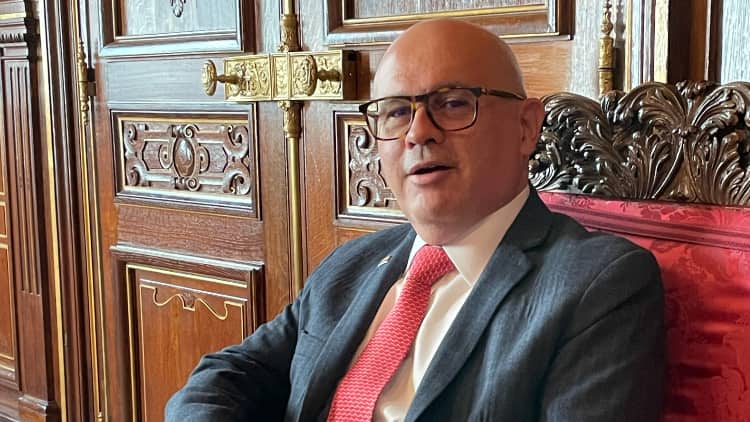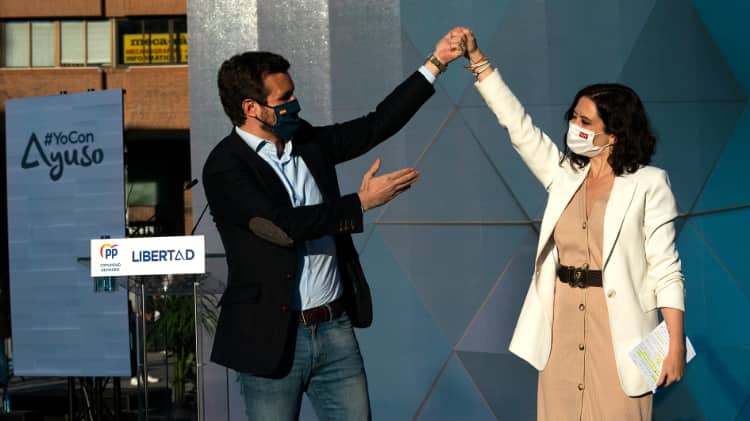Rodolfo Solano
Minister of Foreign Affairs of Costa Rica
Alberto Rubio
He returns from COP26 “optimistic, but pragmatic”. Rodolfo Solano knows that it will not be easy to meet the Sustainable Development Goals by 2030. But he is not giving up. The Costa Rican foreign minister calls for multilateral financing in solidarity for middle-income countries: “The poor receive assistance and the rich have their lives solved. We are in the middle of the bridge and if we do badly we can go back to the other shore”.
For years, Costa Rica has been one of the ‘virtuous’ countries in Latin America. Why is that?
Historically, we have made important decisions. We abolished the death penalty in 1871, we abolished the army 70 years ago, we established free and compulsory education and women’s suffrage. We created social guarantees, where even the Church, the Government and the Communist Party came to an agreement. We bet on renewable energies a long time ago, and on reforesting the country. All these circumstances created a perception in Costa Ricans that quality of life is linked to opportunities. And if there are opportunities in education, health, etc., they feel fulfilled and are able to contribute to others.
Why are these opportunities not available in other countries around yours?
We have three fundamental pillars to achieve that quality of life: democratic institutions, respect for human rights and freedom of expression. They are the highway to development. If there is no development, there can be no democracy. It may not be perfect, but nobody has invented something better. And now we see that in Latin America these three pillars can be affected by populism and other authoritarianisms. That is why it is important to raise our voices on these three principles.
The message I want to leave has a lot to do with financing. Despite the fiscal stress due to the resources dedicated to the pandemic, if we don’t allocate resources to the Sustainable Development Goals (SDGs), when we check in 2030 we may be in for a surprise. I get nothing if I meet the SDGs but those next to me do not.
Common problems, common solutions?
Of course. Unemployment is still a serious problem in Central America, although it is already going down. We reached 24% in the pandemic, now it is at 15% and the latest IMF forecast leaves it at 5%, which is pretty good. However, we have to maintain those numbers 7 years in a row to eliminate extreme poverty.
And then we have immigration. The most secure borders are those where the same conditions of work, education and inclusion are generated on both sides. No country can be an island now. That is why SDGs financing is an opportunity to address migration and underpin a green, sustainable and inclusive economic recovery.
Has COP26 set realistic, achievable targets?
There has been much discussion about the gap between the Paris Agreement and what happened at COP26. There are three total truths. One, the 1.5-degree reduction is an unwaivable target. Two, we need to finance adaptation, for that the $100 billion pledge from the big economies has to be a fact. And the third element is the commitment to protect the oceans.
What do you propose to protect the oceans?
In Costa Rica we have been successful with the green agenda, which aims to have 30% of the territory protected by 2030, which we have already achieved, and 30% of our oceans. Coco Island gives us in the sea 11 times the extension we have on land. 500,000 kilometers to protect! That is why we launched the initiative of the Eastern Tropical Pacific Marine Corridor (CMAR) with Panama, Colombia and Ecuador. But to achieve all that, the promise of funding has to be fulfilled.
Will it be fulfilled? Many countries promise anything but then…
I admit that abolishing the use of fossil fuels is very difficult for some large economies, also for producers, but that is where we have to be creative and make decisions, maybe hard, but that can be financed using new technologies. We want and can be part of the solution. Many promises are for 2030 or 2050. The big question is whether we have that time.
Young people don’t believe those promises.
I understand their criticism. We have taken 17 youth ambassadors to Glasgow. They know that 9 years is the difference between being or not being. And they are worried. My president used to say that if politicians were company managers, we would all be fired.
How to bridge the contradiction between development and environment?
If a diesel bus costs 200,000 and an electric one 600,000, it is impossible for many people to afford it. It requires a financial model. Governments have to facilitate the transition of economies that depend on fossil fuels. How do we do it? Part of it has to come from the country itself and part from the international markets. I know it sounds easy, but it has to be done. And if the COP26 objectives are not met, I think there is a regional opportunity and we are willing to follow that route.
You met on Thursday with Minister Albares in Madrid. What did you talk about?
For Costa Rica, Spain is a friend and strategic partner. We share universal values but we want to deepen our alliance, not only in bilateral political dialogue but also in multilateral dialogue and also in trade and investment. We talked about all this for an hour.
Is there room for progress in the economic relationship?
We have an average of $500 million in exchanges, but we aspire to more. Spanish companies can not only participate in projects in my country but use Costa Rica’s human talent to enter the rest of the region, which in the next 20-25 years will require investments in infrastructure of all kinds. I believe that the Spanish private sector has great opportunities in Central America, but we have to identify where are the structural flaws that hinder a greater presence.
What are you referring to?
Throughout the region we need to improve when it comes to public tenders. We need legal certainty. I have proposed to create an observatory where we put all the projects. The complaint of Spanish businessmen is the lack of time to carry out technical and financial studies and to present projects. We must establish clear and transparent rules so that everyone has timely information. We can make joint ventures and grow together in third markets.
I imagine you two also talked about Nicaragua.
Of course. We are concerned about democratic institutions, which is Central America’s only letter of introduction. But it is difficult to achieve if presidential candidates are imprisoned or journalists have to do their work from Costa Rica because they cannot enter Nicaragua. Spain and the EU have been very firm in this regard. The electoral process has lacked minimum conditions of participation and transparency.
But Ortega has not backed down.
The Nicaraguan process requires convening all internal actors. In the 21st century, leadership that generates benefits for the population is required and that is based on people expressing their opinion freely. That is the minimum that must be understood. It is very confusing what is happening in this internal framework. What is not confusing is that this is a very clear opportunity to know who is on the right side of history and who is not. And history demands democracy, respect for human rights and freedom of expression.
Venezuela is less talked about currently, but it is not a minor problem.
You are right. Five million Venezuelans left the country. It is an unfortunate drama. We have some hope in the dialogue taking place in Mexico. Let us not lose sight of the fact that there are local electoral processes in 2022 in both Venezuela and Nicaragua. And it is possible that spaces for dialogue can be opened. But the mistakes of the past should not be repeated, as in 2018 with Nicaragua, because look where we are now.
Couldn’t SEGIB play a role in those processes?
You touched on an important issue. All the mechanisms in the region -Mercosur, SICA, OAS- have some setback. SEGIB seems to be a virtuous space for meeting and cooperation. We have to keep betting on it. In the meantime, let us hope that we will soon get to the election of the new secretary general.







